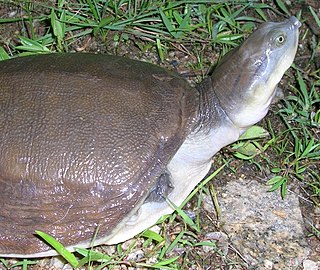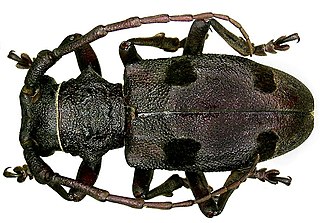
The Indian flapshell turtle is a freshwater species of turtle found in South Asia. The "flap-shelled" name stems from the presence of femoral flaps located on the plastron. These flaps of skin cover the limbs when they retract into the shell. It is unclear what protection the flaps offer against predators. Indian flapshell turtles are widespread and common in the South Asian provinces. It is morphologically an evolutionary link between the softshell and hardshell aquatic turtles. Exploitation for profit and habitat change are threats to their survival.

Lissemys is a genus of softshell turtles in the subfamily Cyclanorbinae of the family Trionychidae. The genus is indigenous to southern Asia.

Rhizomelic chondrodysplasia punctata is a rare developmental brain disorder characterized by systemic shortening of the proximal bones, seizures, recurrent respiratory tract infections and congenital cataracts. The affected individuals have low levels of plasmalogens.
Conradi–Hünermann syndrome is a rare type of chondrodysplasia punctata. It is associated with the EBP gene and affects between one in 100,000 and one in 200,000 babies.
Chondrodysplasia punctata is a clinically and genetically diverse group of rare diseases, first described by Erich Conradi (1882–1968), that share the features of stippled epiphyses and skeletal changes.
The European White Elm cultivar Ulmus laevis 'Punctata' was mentioned in 1873, 1889, and later in 1903 as U. effusa f. punctata, but without description.
The Field Elm cultivar Ulmus minor 'Folia Alba-Punctata' was first identified by C. de Vos in 1867, as Ulmus campestris fol. albo punctatis. The tree is assumed to be U. minor by Green.

Arylsulfatase E, also known as ARSE, is an enzyme that, in humans, is encoded by the ARSE gene.

Monarda punctata is a herbaceous plant in the mint family, Lamiaceae, that is native to eastern Canada, the eastern United States and northeastern Mexico. Common names include spotted beebalm and horsemint.

Ransoniella punctata, common name the brown-spotted cowry, is a species of sea snail, a cowry, a marine gastropod mollusk in the family Cypraeidae, the cowries.

Phrissomini is a tribe of longhorn beetles of the subfamily Lamiinae. It was described by Thomson in 1860.
Stixis is a genus of longhorn beetles of the subfamily Lamiinae,
Grevillea punctata is a shrub of the genus Grevillea native to a small area near Ravensthorpe in the Goldfields-Esperance region of Western Australia.
Stixis is the scientific name of two genera of organisms and may refer to:
The field elm cultivar 'Punctata' ['spotted', the leaf] first appeared in the 1886–87 catalogue of Simon-Louis of Metz, France, as U. campestris punctata. It was distributed by the Späth nursery, Berlin, in the 1890s and early 1900s as U. campestris punctataSim.-Louis, the Späth catalogue listing it separately from U. campestris fol. argenteo-variegata and from U. campestris fol. argenteo-marginata. Green considered it possibly a synonym of the Field Elm cultivar 'Argenteo-Variegata'.
Stixis grossepunctata is a species of beetle in the family Cerambycidae. It was described by Stephan von Breuning in 1942.
Stixis usambarica is a species of beetle in the family Cerambycidae. It was described by Adlbauer in 2010. It is known from Tanzania.
Stixis is a South-East Asian genus of plants in the order Brassicales; they are typically lianas. This genus has previously been placed in the Stixaceae and Capparaceae, but under the APG IV system is now included in the family Resedaceae.

Stixis suaveolens is a species of liana in the family Resedaceae; no subspecies are listed in the Catalogue of Life. It is found in India, southern China and Indo-China; in Vietnam it may be called cây tôn nấm.

Protea punctata, also known as the water sugarbush or water white sugarbush, is a shrub belonging to the genus Protea which is found growing in the wild in South Africa.








